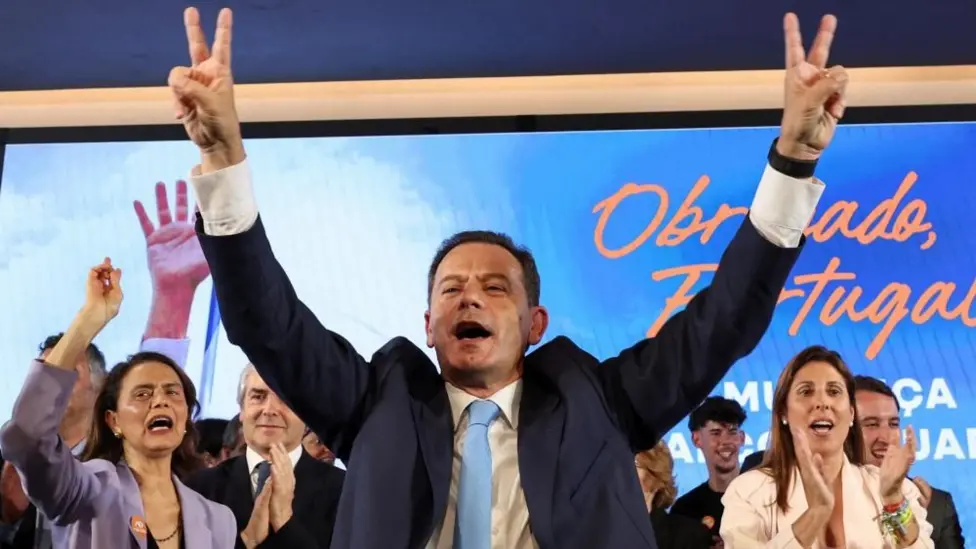By José Santana Pereira (Iscte-University Institute of Lisbon) and Guya Accornero (Iscte-University Institute of Lisbon)
On 18 May 2025, Portugal held snap legislative elections for the third time in just over three years. The results confirmed the governing centre-right coalition, Aliança Democrática (AD), as the most voted political force, although still far from securing an absolute majority, with 31.21% of the vote and 91 out of 230 parliamentary seats. The AD was followed by the centre-left Partido Socialista (PS), which obtained 22.83% of the vote – narrowly ahead, by fewer than 5,000 votes, of the radical right-wing populist party Chega, which garnered 22.76%. Notably, due to the characteristics of the electoral system used in Portuguese legislative elections, Chega managed to elect more MPs (60) than the PS (58), thereby establishing itself as the second-largest parliamentary force.
Only six years after its modest parliamentary debut with the election of a single MP (its leader, André Ventura), Chega is now able to challenge the PS’s role as main opposition party. Moreover, its electoral growth has contributed to consolidating a clear right-wing majority in the Assembleia da República. This majority potentially opens the door to a constitutional revision without the involvement of the socialists, and hence of a distinctly right-wing (rather than centrist) nature. For the time being, the AD leader, Luís Montenegro, who was appointed formateur by President Marcelo Rebelo de Sousa, has declared that such a revision is not among his immediate priorities.
The loss of approximately 370,000 votes compared to the 2024 election prompted PS leader Pedro Nuno Santos to resign on election night. Other left-wing parties also achieved very modest results: the Coligação Democrática Unitária (CDU, composed of communists and greens) and the Bloco de Esquerda (BE, founded in 1999 through the merger of several radical left parties and groups) were reduced to their lowest historical levels. Nevertheless, their respective leaders chose to remain in office and prepare for renewed struggle. On this side of the ideological spectrum, one political force experienced a relatively positive outcome: Livre, a pro-European left-wing party founded in 2014, emerged as the primary actor to the left of the PS, securing 4.07% of the vote and gaining two additional parliamentary seats compared to the previous legislature.
Unlike in Greece and Spain, Portugal’s party system had, until recently, resisted the political turbulence induced by the financial crisis, austerity measures, and the subsequent cycles of protest. While both the PS and the centre-right Partido Social Democrata (PSD) emerged from the 2015 post-crisis elections with significantly reduced support compared to earlier contests, no major new competitor had entered the political arena at the time. However, the winds of change eventually reached Portugal. The country’s political landscape began to shift in 2019 with the parliamentary entry of Chega, Livre, and Iniciativa Liberal (IL). While the latter two have maintained only a modest presence in Parliament, Chega has exhibited remarkable electoral growth, progressing from 1 to 12 MPs, then to 50, and now to 60. The rise of Chega, alongside the stable performances of Livre and IL and the entry of Juntos Pelo Povo (which secured one MP in the Madeira constituency), means that in the current legislature, one-third of parliamentary seats are held by political forces that were absent from Parliament just six years ago – a remarkable rate of party system innovation for Portuguese standards. At the same time, the effective tripolarisation of parliamentary politics in Portugal – an outcome of the cordon sanitaire strategy pursued by Mr. Montenegro during his first term – is further reinforced by these electoral results, particularly if the Prime Minister continues to reject a stable alliance with the populist radical right.
For years, the absence of a successful radical right-wing populist party was regarded as an exceptional feature of Portugal in the broader European context, drawing attention from both observers and scholars. A few political scientists urged caution, noting that it might merely be a matter of time before a new political actor emerged to harness the political capital of
abstention and
populist attitudes, two prevalent features in Portuguese society. That scenario appears to have materialized in recent years, and at an exceptionally rapid pace. The results of the 18 May 2025 elections must therefore be analysed within the broader dynamics of a process through which a new party has succeeded in establishing itself and mobilising a significant segment of the electorate – likely including many former non-voters – around the core themes of populist right-wing discourse, both in Europe and beyond: immigration, corruption, defence of the traditional family and of Western values.
Chega has made substantial gains in heavily touristified southern regions (such as the Algarve) and in areas historically aligned with communist support (such as Alentejo). The latter development initially led to interpretations suggesting a direct transfer of votes from the CDU to Chega. However, these interpretations were challenged by an analysis of the 2024 election, which instead pointed to the mobilization of previously abstaining voters. An
analysis of 2025 exit poll data by Pedro Magalhães and João Cancela contributes to discard that understanding, by showing that Chega voters tend to be rather young, whereas communist voters have been often depicted as generally older than the average Portuguese voter.
Undoubtedly, this swift transformation will be the subject of extensive academic inquiry in the coming years. A key question will be whether a significant portion of the Portuguese electorate has indeed “lost the shame” of openly expressing views associated with the radical right, anti-immigration stances, and populism – as argued in Vicente Valentim’s recent book– or whether alternative explanatory factors are at play. Whatever the case, the 18 May 2025 elections will likely represent a point of no return in the ongoing transformation of Portugal’s political landscape.
Photo source: https://www.bbc.co.uk/news/articles/c3e5v5lpddyo


